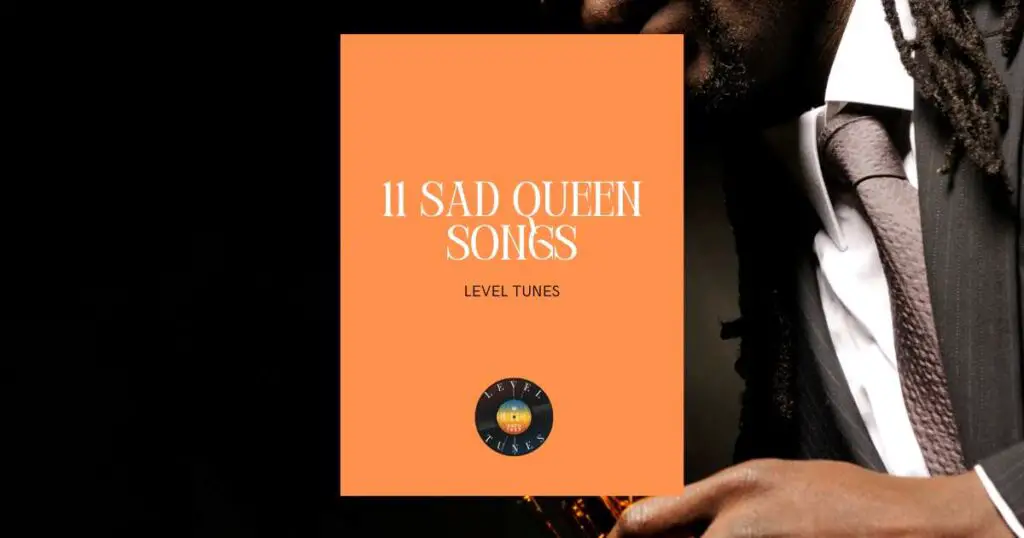11 Sad Queen Songs: Queen’s Saddest Hits
Hey there, music lovers and fellow DJs, it’s TBone here, the heart and soul behind Level Tunes.
With over 20 years of spinning tracks and diving deep into the music industry, I’ve developed a profound love for all genres, but there’s something uniquely touching about Queen’s music that always draws me back.
Today, I’m excited to share a special list with you – 11 sad Queen songs that have moved me and countless others.
Why focus on the melancholy, you ask? Well, amidst their rock anthems and electrifying performances, Queen has crafted some truly heart-wrenching tunes that showcase their versatility and depth.
These songs resonate with the complexities of human emotions, and as someone who lives and breathes music, I believe they deserve a spotlight. Join me as we explore these masterpieces, and perhaps, find a new appreciation for the emotional range of this legendary band.
Here are the sad Queen songs that you can check out:
List Of Sad Queen Songs
Sad Queen songs in a list format:
“Love of My Life”
“Love of My Life” is a breathtaking ballad by Queen, penned by the legendary Freddie Mercury for the album “A Night at the Opera,” released in 1975 under EMI Records in the UK and Elektra Records in the US. This song is a testament to Mercury’s songwriting prowess, offering a tender, melancholic love story that has touched hearts worldwide. What makes it stand out for me is not just the emotional depth of the lyrics but the beautiful arrangement – Brian May’s harp-like acoustic guitar coupled with Mercury’s passionate vocal delivery. It’s a masterpiece that showcases the band’s ability to transcend rock and delve into more intimate, vulnerable territories. The song’s live versions, particularly with Mercury at the piano and May’s acoustic guitar accompaniment, highlight its timeless appeal and the deep connection Queen had with their audience. Choosing this track was a no-brainer for its raw emotion and the way it showcases Queen’s softer, yet equally powerful, side.
“Who Wants to Live Forever”
“Who Wants to Live Forever” is a poignant exploration of the theme of mortality, crafted by guitarist Brian May for the 1986 album “A Kind of Magic,” which was released under the EMI and Capitol Records labels. This song was inspired by the film “Highlander,” and its orchestral arrangements, combined with Freddie Mercury’s hauntingly beautiful vocals, create a powerful emotional experience. The addition of the National Philharmonic Orchestra adds a depth and richness that elevates the song to a cinematic level. I’m particularly drawn to the contrast between May’s soft, introspective verses and Mercury’s soaring choruses, which echo the inevitable passage of time and the pain of eternal separation. This song stands out for its ability to blend rock with classical elements seamlessly, showcasing Queen’s musical versatility and their knack for creating profoundly moving music.
“The Show Must Go On”
Written primarily by Brian May, “The Show Must Go On” comes from Queen’s 1991 album “Innuendo,” released by Parlophone and Hollywood Records. This song is a powerful statement about facing adversity and continuing despite the odds, a reflection of Freddie Mercury’s own battle with AIDS, although his illness was not publicly known at the time. Mercury’s vocal performance is nothing short of heroic, delivering powerful emotion and resilience in the face of personal struggle. The song’s orchestration, featuring May’s iconic guitar solos, complements the theme of enduring spirit. I chose this song for its uplifting message cloaked in a sad reality, a reminder of the power of music to inspire courage and hope. It’s a poignant farewell from Mercury, showcasing his incredible talent and indomitable spirit.
“These Are the Days of Our Lives”
Roger Taylor wrote “These Are the Days of Our Lives” for the 1991 album “Innuendo,” reflecting on life and the passage of time. The song features a softer, more reflective side of Queen, with its gentle rhythm and nostalgic lyrics that resonate with anyone looking back on the simpler times of youth. The accompanying video, one of the last appearances of Freddie Mercury before his death, adds a layer of poignancy, making the song a touching tribute to life’s fleeting moments. I’m particularly moved by Mercury’s tender vocal delivery and John Deacon’s smooth bass line, which together create a sense of bittersweet reminiscence. This song is a beautiful reminder to cherish every moment, chosen for its emotional depth and the intimate look into the band’s reflections on life.
“Save Me”
“Save Me” is a ballad written by Brian May, featured on the 1980 album “The Game,” released under EMI in the UK and Elektra in the US. This song delves into the despair and hopelessness of a relationship’s end, highlighted by May’s poignant lyrics and Mercury’s emotive vocal performance. The arrangement, with its blend of acoustic and electric guitars, builds to a dramatic climax that perfectly captures the song’s emotional turmoil. What draws me to “Save Me” is not just its lyrical content but the way the music complements the storytelling, creating a vivid picture of heartbreak and longing. It’s a testament to Queen’s ability to craft songs that resonate on a deeply personal level.
“Too Much Love Will Kill You”
“Too Much Love Will Kill You” was initially written by Brian May in the late ’80s but found its way to the public with Queen’s 1995 posthumous album “Made in Heaven,” released by Parlophone and Hollywood Records. The song, featuring May on lead vocals in some versions and Mercury in others, explores the complexities of love and the pain it can cause. Its heartfelt lyrics and the emotional delivery capture the agony of being caught in a love triangle. The song stands out for its honest reflection on personal turmoil, underscored by May’s expressive guitar work. I chose it for its raw portrayal of love’s darker side and its showcase of Queen’s depth in exploring
human emotions through music.
“A Winter’s Tale”
“A Winter’s Tale” is one of the last songs Freddie Mercury wrote before his passing, featured on Queen’s 1995 album “Made in Heaven,” under the Parlophone and Hollywood Records labels. This song is a stark departure from the band’s usual rock anthems, offering instead a serene, almost dreamlike reflection on the beauty of winter. Mercury’s lyrics, inspired by a view from his Montreux home, paint a picture of tranquility and peace, a poignant contrast to his ongoing battle with illness. The soft, lilting melody and Mercury’s gentle vocals give this track a soothing quality that’s both uplifting and bittersweet. I’m drawn to “A Winter’s Tale” for its simplicity and the emotional weight it carries, showcasing Mercury’s ability to find beauty in the face of adversity.
“No-One but You (Only the Good Die Young)”
This track, the only one recorded after Freddie Mercury’s death, was penned by Brian May and is found on the 1997 compilation album “Queen Rocks,” released by Parlophone and Hollywood Records. It serves as a tribute to Mercury and all those who’ve left us too soon. The song features Brian May, Roger Taylor, and John Deacon, marking the last time these three members recorded together. The powerful lyrics, combined with the emotional delivery of the band, create a moving homage to their lost friend and frontman. What makes “No-One but You” stand out for me is its heartfelt sincerity and the raw emotion that comes through in the performance, a reminder of the band’s tight-knit bond and their resilience in the face of loss.
“Mother Love”
“Mother Love” is another gem from the “Made in Heaven” album, the last song Freddie Mercury recorded before his death. Written by Mercury and Brian May, the song is a hauntingly beautiful ballad that explores themes of longing, loss, and the desire for maternal comfort. Mercury’s vocals are filled with emotion, and May’s guitar work is both delicate and powerful, providing a poignant backdrop to the lyrics. The song ends with a montage of past Queen performances, a touching tribute to Mercury’s life and career. I chose “Mother Love” for its deep emotional impact and its significance as Mercury’s final recording, showcasing his incredible talent and the profound loss felt by his passing.
“The Miracle”
“The Miracle,” the title track from Queen’s 1989 album released under Parlophone and Capitol Records, is a song that celebrates the wonders of the world with a sense of awe and optimism. Despite its upbeat tempo and hopeful lyrics, there’s an underlying sadness when considering Mercury’s health struggles at the time. The song reflects on the beauty in the world and the human capacity for kindness, a poignant message from a band facing its own challenges. The harmonies, intricate arrangements, and Mercury’s dynamic vocal range make “The Miracle” a standout track. I appreciate its ability to convey a sense of wonder and melancholy simultaneously, highlighting Queen’s mastery of emotional complexity in their music.
“Is This the World We Created…?”
Written by Freddie Mercury and Brian May, “Is This the World We Created…?” is a stark, acoustic track from Queen’s 1984 album “The Works,” released by EMI and Capitol Records. The song offers a somber reflection on global issues and the state of humanity, a departure from the band’s more grandiose rock compositions. Mercury’s tender vocals and May’s simple yet evocative guitar work create a powerful message about responsibility and change. I’m drawn to this song for its directness and the way it showcases Queen’s ability to engage with social commentary through their music, proving that their talents extended far beyond the realms of rock and roll.
Fun Facts: Sad Queen Songs
“Love of My Life”
- Fun Fact: “Love of My Life” was never released as a single in the UK or the US, but it became one of Queen’s most popular songs. The song gained immense popularity in South America, particularly in Brazil, after being performed live in 1981 during the Rock in Rio festival. Freddie Mercury’s solo performance, accompanied by thousands of fans singing along, is one of the most memorable moments in rock history, showcasing the song’s global impact.
“Who Wants to Live Forever”
- Fun Fact: The song’s inclusion in the “Highlander” movie gave it a cinematic quality, but it also led to an interesting collaboration. The film’s director, Russell Mulcahy, directed the music video for “Who Wants to Live Forever,” which featured scenes from the movie. The video is notable for its lavish production and the way it seamlessly blends the fantasy elements of “Highlander” with Queen’s performance.
“The Show Must Go On”
- Fun Fact: Despite Freddie Mercury’s deteriorating health at the time of recording, he delivered an incredibly powerful vocal performance. Brian May has recounted how Mercury managed to perform the song in one take, after taking a shot of vodka and declaring, “I’ll fucking do it, darling!” This moment has become a part of rock folklore, highlighting Mercury’s dedication and talent.
“These Are the Days of Our Lives”
- Fun Fact: The song’s music video is the last appearance of Freddie Mercury on camera before his death. Filmed in black and white to mask Mercury’s illness, the video has a deeply poignant feel. Roger Taylor mentioned that the line “I still love you” was directed by Mercury to his fans, making the video a powerful farewell message.
“Save Me”
- Fun Fact: The animated sequences in the “Save Me” music video were ahead of their time. The video features pioneering use of rotoscope animation, blending live-action footage with animated sequences to create a visually striking effect. This innovative approach set a new standard for music videos in the early 1980s.
“Too Much Love Will Kill You”
- Fun Fact: Brian May first performed “Too Much Love Will Kill You” live at the Freddie Mercury Tribute Concert in 1992, even before the Queen version was released. The song’s emotional weight was amplified by the event, as it celebrated Mercury’s life and raised awareness for AIDS research. May’s solo performance is remembered as one of the most moving moments of the concert.
“A Winter’s Tale”
- Fun Fact: “A Winter’s Tale” was one of the last songs Freddie Mercury wrote and recorded. The lyrics reflect his views from his apartment over Lake Geneva, with Mercury expressing a sense of wonder and peace despite his illness. This song stands out as a testament to Mercury’s ability to find beauty in the world around him, even in his final days.
“No-One but You (Only the Good Die Young)”
- Fun Fact: This is the only song recorded by the remaining members of Queen after Freddie Mercury’s death as a tribute to him. It marks the end of an era for the band, as it’s the last song featuring John Deacon, who retired from the music industry shortly after. The song serves as a touching homage to Mercury and a poignant reminder of the band’s legacy.
As we’ve journeyed through these 11 sad yet beautiful Queen songs, we’ve uncovered the depth and diversity of their music. Each track tells a story, evoking emotions that resonate deeply. Queen’s legacy is a testament to their unparalleled ability to connect with listeners across generations. Keep rocking!
Thanks for reading.
TBone




